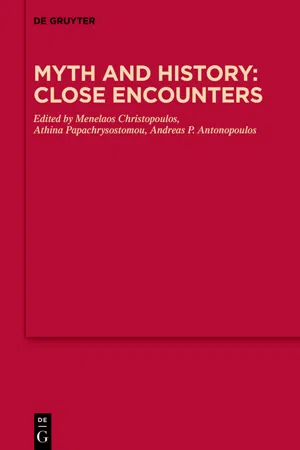This contribution advances some thoughts concerning the Homeric Epigrams, a group of short epic poems which have been – falsely – attributed to Homer and are supposed to depict particular moments of his life. The whole corpus of these poems is preserved in a Life of Homer, a text dated approximately between the first and the second centuries CE, at least eight centuries later than the historical period in which Homer may have lived;1 the authorship of this Life is (also) falsely ascribed to Herodotus. As noted in the relevant scholarship, some of the poems of this corpus are separately included, sometimes slightly altered, in other sources such as two Plutarchean or pseudo-Plutarchean studies (μελέται), three anonymous Lives (Vita Romana and Vitae Scorialenses), a Life of Homer initially incorporated in Proclus’ Chrestomatheia, the Suda Lexicon (s.v. Homer) and finally the Certamen (Contest between Homer and Hesiod).2 It goes without saying that most of these Epigrams are older than the Testimonia in which they are included. Some of them are better known, such as the Epigram for Midas (no. 3), one of the best-known of the collection,3 the song for the pot-makers (no. 14),4 the longest of all, or the song of Eiresione (no. 15),5 a folk-song which, together with the other two just mentioned, are less related to the story of the pseudo-Herodotean Life.6 In this chapter I will try to focus on some particular aspects of the Epigrams which better illustrate their supposed relationship with the poetical persona of Homer, who is more often perceived as a mythical figure rather than a historical one.
It should be first recalled that the pseudo-Herodotean Life of Homer narrates the birth, the growing up, the coming of age and the many wanderings of the boy who was born in Smyrna by the river Meles and who was for that reason first named Melesigenes; later, once he was definitely blinded, he was given the name Homer (Ὅμηρος), as the inhabitants of Cuma (Κύμη), where he later resided, used to call blind people. According to the Lives’ narrative, before being struck by blindness, Homer visited Etruria, Spain and mainly Ithaca, where he familiarized himself with the local tradition on Odysseus; when he definitely lost his eyesight, he left Smyrna, where he had already earned a great reputation as a poet, and visited Teichos, Cuma, Phocaea, Erythraea and Chios where he settled, got married and begot two daughters. He then decided to visit the mainland of Greece. He first moved to Samos, then to Ios, hoping to sail from there to the Greek mainland and in particular to Athens; but he never attained this target since he finally succumbed to the illness which was already keeping him in Ios; it is in this island where he was finally buried by the sea-side.
By reading the Epigrams one can easily see the care taken by the author of the Lives to give a persuasive relationship between the poems themselves and the particular circumstances of Homer’s adventures in which they are supposed to be composed.7 This involves also the main questions raised already in antiquity concerning Homer’s origin, birth and descent. On these precise questions some verses of the fourth Epigram give, perhaps, an interesting response:
Οἴῃ μ’ αἴσῃ δῶκε πατὴρ Ζεύς κύρμα γενέσθαι
νήπιον αίδοίης ἐπὶ γούνασι μητρὸς ἀτάλλων.
ἥν ποτ’ έπύργωσαν βουλῇ Διὸς αἰγιόχοιο
λαοὶ Φρίκωνος, μάργων ἐπιβήτορες ἵππων,
ὁπλότεροι μαλεροῖο πυρὸς κρίνοντες Ἄρηα, 5
Αἰολίδα Σμύρνην ἁλιγείτονα ποντοτίνακτον
ἥν τε δι’ ἀγλαὸν εἶσιν ὕδωρ ἱεροῖο Μέλητος.
ἔνθεν ἀπορνύμεναι κοῦραι Διός, ἀγλαὰ τέκνα,
ἠθελέτην κλῇσαι δῖαν χθόνα καὶ πόλιν ἀνδρῶν
οἱ δ’ ἀπανηνάσθην ἱερὴν ὄπα, φῆμιν ἀοιδῆς 10
ἀφραδίῃ. τῶν μέν τε παθών τις φράσσεται αὖτις
ὄς σφιν ὀνειδείῃσιν ἐμὸν διεμήσατο πότμον.
κῆρα δ’ έγὼ τήν μοι θεὸς ὤπασε γεινομένῳ περ
τλήσομαι, ἀκράαντα φέρων τετληότι θυμῷ.
οὐδέ τι μοι φίλα γυῖα μένειν ἱεραῖς ἐν ἀγυιαῖς 15
Κύμης ὁρμαίνουσι, μέγας δέ με θυμὸς ἐπείγει
δῆμον ἐς ἀλλοδαπῶν ἰέναι ὀλίγον περ ἐόντα.
To what a fate did Zeus the Father give me a prey even
while he made me to grow, a babe at my mother’s knee!
By the will of Zeus who holds the aegis
the people of Phricon, riders on wanton horses,
more active than raging fire in the test of war, 5
once built the towers of Aeolian Smyrna, wave-shake...
